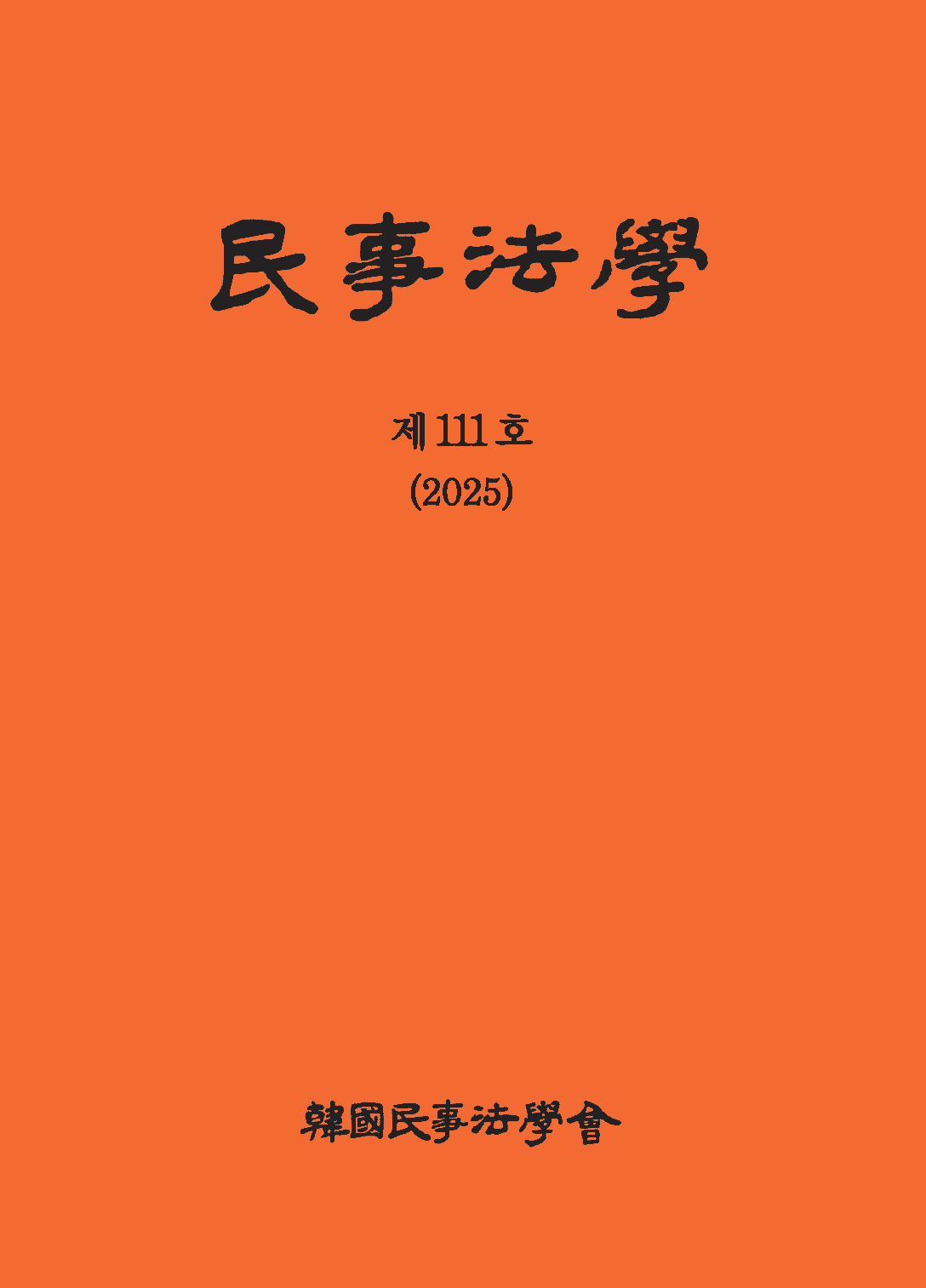학술논문
재산분할 대상 재산의 판단기준으로서의 기여 - 간접적 기여, 적극적 기여, 불법적 기여를 중심으로 -
이용수 67
- 영문명
- Contribution as a Criterion for Determining Marital Property Subject to Division - Focusing on Indirect, Active, and Unlawful Contributions -
- 발행기관
- 한국민사법학회
- 저자명
- 현소혜
- 간행물 정보
- 『민사법학』제111호, 139~173쪽, 전체 35쪽
- 주제분류
- 사회과학 > 사회과학일반
- 파일형태
- 발행일자
- 2025.06.30
7,000원
구매일시로부터 72시간 이내에 다운로드 가능합니다.
이 학술논문 정보는 (주)교보문고와 각 발행기관 사이에 저작물 이용 계약이 체결된 것으로, 교보문고를 통해 제공되고 있습니다.

국문 초록
대법원은 수차례에 걸쳐 특유재산일지라도 “다른 일방이 적극적으로 특유재산의 유지에 협력하여 그 감소를 방지하였거나 그 증식에 협력하였다고 인정되는 경우” 또는 “특유재산이라도 이를 취득하고 유지함에 있어 상대방의 가사노동 등이 직ㆍ간접적으로 기여”한 경우라면 재산분할의 대상이 될 수 있다고 판시해 왔으며, 하급심은 위와 같은 설시에 기초하여 혼인이 상당한 기간에 이르면 사실상 부부 명의의 모든 재산을 재산분할의 대상에 포함시켜 왔다. 하지만 이는 부부별산제의 이념에 반하며, 재산분할에 관한 당사자의 예측가능성을 현저히 해치는 문제가 있다. 이에 본 논문에서는 기여의 유형별로 나누어 재산분할의 대상이 되는 재산과 그렇지 않은 재산을 분류하기 위한 기준을 제시하고자 하였다. 논증 결과 도달한 결론은 다음과 같다. 첫째, 특유재산이라도 상대방 배우자가 금전 또는 현물 출자 등으로 그 취득ㆍ유지 및 가치 증가에 직접적으로 기여했다면 재산분할의 대상이 될 수 있다. 다만, 직접적 기여행위가 불법적 기여에 해당하는 경우에는 그러하지 아니하다. 둘째, 직접적 기여가 없는 경우라도 가사노동 등에 의한 간접적 기여가 있었다면, 혼인 공동생활과 관련 있는 특유재산 및 그 가치증가분은 재산분할의 대상이 될 수 있다. 반면 간접적 기여가 있었더라도 혼인 공동생활과 관련 없는 특유재산 및 그 가치증가분은 재산분할의 대상이 될 수 없다. 다만, 상대방 배우자의 특별한 기여 내지 특별한 희생을 인정할 수 있는 경우에는 그러하지 아니하다. 셋째, 혼인 공동생활과의 관련성은 취득권원의 객관적 성질, 관리ㆍ수익 과정에서의 상호작용 유무, 부부 쌍방 간의 생활비용 분담 방법 및 정도, 혼인기간과 재산의 취득시기 및 점유ㆍ사용 관계 등을 고려하여 판단한다. 넷째, 실질적 특유재산이라도 상대방 배우자의 부양을 위해 필요한 경우에는 예외적으로 부양적 재산분할의 대상으로 삼을 수 있다.
영문 초록
The Supreme Court of Korea has repeatedly held that even if certain property is classified as one spouse’s separate property, it may still be subject to division if “the other spouse actively contributed to the preservation or increase of such property” or if “the acquisition and maintenance of the property involved direct or indirect contributions such as household labor by the other spouse.” Based on these holdings, the lower courts have tended to include all assets held in either spouse’s name in the divisible marital estate in case of a marriage that has been maintained over a substantial period of time. However, this judicial practice runs counter to the principle of separation of property between spouses and significantly undermines the predictability of the outcome of property division. Thus, this article seeks to propose a set of standards for determining the property subject to division, by categorizing various types of contributions.
The conclusions reached through this analysis are as follows. First, even if property qualifies as a spouse’s separate property, it may be subject to division if the other spouse made a direct contribution to its acquisition, preservation, or appreciation in value, such as through monetary or in-kind contributions. However, this does not apply where such direct contribution constitutes an unlawful cause. Second, even in the absence of direct contribution, where there has been indirect contribution through household labor etc., separate property and any appreciation thereof that is related to the joint life of the marriage may be subject to division. Conversely, separate property and its appreciation that bear no relation to the marital joint life shall not be subject to division, even where indirect contributions have been made—except in cases where the other spouse's contribution amounts to a special contribution or sacrifice. Third, the relevance of the property to the joint life of the marriage shall be assessed based on various factors, including the objective nature of the acquisition title, the interaction between the spouses in the course of property management, the method and extent of cost-sharing between the spouses, the duration of the marriage, the timing of acquisition, etc. Fourth, even if certain separate property is not subject to distributive property division, it may nonetheless be subject to division for support purposes, where it is necessary for the maintenance of the other spouse.
목차
Ⅰ. 서론
Ⅱ. 논의의 전제
Ⅲ. 간접적 기여
Ⅳ. 적극적 기여
Ⅴ. 불법적 기여
Ⅵ. 결론
참고문헌
키워드
해당간행물 수록 논문
- 日本法における人格権侵害の救済(非金銭的救済手段)
- 공동저당에서 동순위 채권자의 취급 문제 - 공동저당의 기본 구조와 경매대가의 의미를 중심으로 -
- 수인의 채권자, 채권의 준공동소유, 공동명의 예금
- 한국에서의 인격권 침해에 대한 비금전적 구제수단
- 日本法における人格権侵害による損害賠償―金銭賠償及び慰謝料
- 論人格權法總論-台灣篇
- 中国大陆地区的人格权法立法概况
- 인격권 침해에 대한 금전적 손해배상 및 위자료
- 사무관리자의 손해배상책임에 대한 재고 - 민법 제734조 제3항 본문을 중심으로 -
- 재산분할 대상 재산의 판단기준으로서의 기여 - 간접적 기여, 적극적 기여, 불법적 기여를 중심으로 -
- 인격권 총론
- 제10회 동아시아 민사법 국제학술대회(2024년)- 학술대회 개최 보고 및 각국 발표문 -
- 인격권의 상업화
- 中国人格权商业化保护概况
- 日本法における人格要素の商業的利用
- 台灣法人格權商業利用的發展
- 中国法上的人格权请求权
- 人格权侵害之金钱赔偿及慰抚金
- 人格権法総論
- 취득시효의 정당화 근거 - 프랑스 판례의 검토를 통하여 -
- 주택임대차 거래의 합리화를 위한 법제 및 거래 문화 개선 방안
- 人格權侵害之救濟
- 臺灣法上人格權侵害之金錢賠償及慰撫金
참고문헌
관련논문
사회과학 > 사회과학일반분야 BEST
- AI와 디지털 문화 산업의 결합에서 저작권 및 윤리적 규범 준수의 필요성 연구
- 인공지능(AI)과 윤리
- 종합병원 간호사의 환자안전문화인식과 조직의사소통만족이 안전간호활동에 미치는 영향
사회과학 > 사회과학일반분야 NEW
더보기최근 이용한 논문
교보eBook 첫 방문을 환영 합니다!

신규가입 혜택 지급이 완료 되었습니다.
바로 사용 가능한 교보e캐시 1,000원 (유효기간 7일)
지금 바로 교보eBook의 다양한 콘텐츠를 이용해 보세요!



